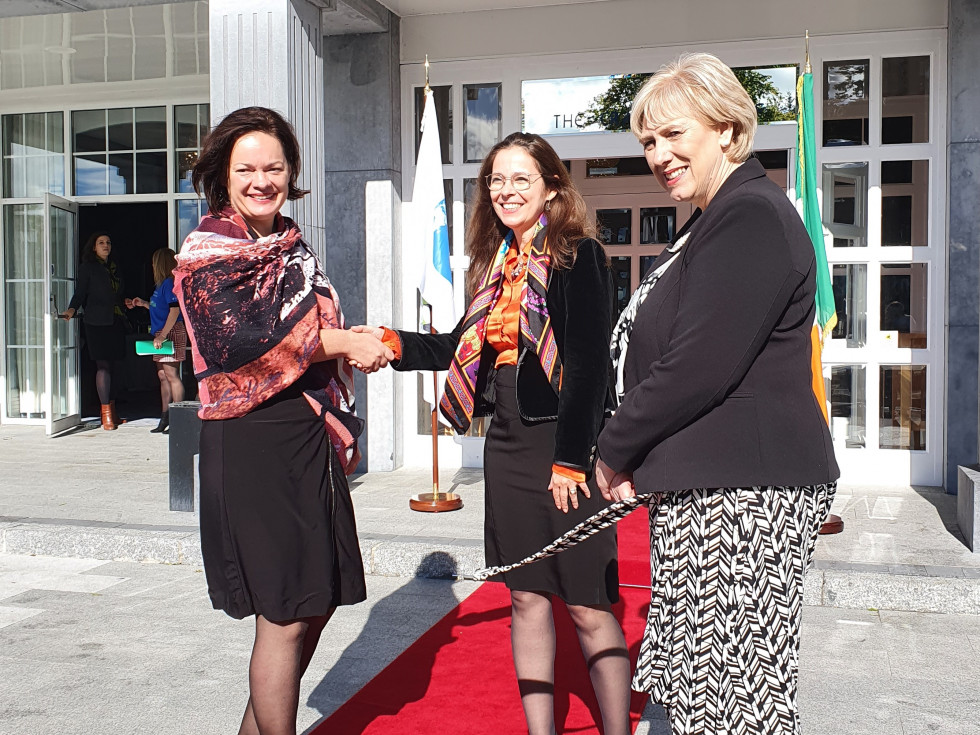Secretary of state Buzeti at OECD conference on impacts of war in Ukraine on agriculture

State secretary Tatjana Buzeti with the representatives of OECD. | Author Ministrstvo za kmetijstvo, gozdarstvo in prehrano.
Central topics included the digital, green and energy transformation, support to small, medium-sized and social enterprises, access to lifelong learning, gender equality, social inclusion, involvement of the youth in rural policy creation. Discussion focussed on the appropriate addressing of challenges posed by rural areas, with a particular focus on food security and safety, high cost of living, opportunities of circular economy, role of women and youth in rural communities, and opportunities of interlinks and cooperation in creating development policies.
Russian aggression on Ukraine disrupted the World with new problems in the areas of energy and food market, thus jeopardising the endeavours by national governments of re-establishing viable economies. This is adversely impacting rural areas at the very time of their endeavours to comply with the green and digital transformation commitments, and facing the challenges of aging populations, migrations, dwindling populations, globalisation and, last but not least, the urbanisation. These leaps and challenges highly impact the rural inhabitants, their lives, work, productivity and nutrition.
In discussing these topics, Ms Tatjana Buzeti, Secretary of State, exposed that retaining the youth in rural areas poses a real challenge and, in resolving it, the vitality and attractiveness of rural areas are of great importance in addition to entrepreneurship and good connectivity: “New opportunities, as digitalisation, innovations, green jobs, and tourism, diversify the economy in rural areas, thus enhancing the level of well-being. Rural areas must be integrated into pursuing the European and national economic development strategies, into resolving the climate crisis, in nature conservation, infrastructure development, social development, education, and in particular in agriculture, as defined in the Long-term vision for Slovenian rural areas. Of key importance here is the good connectivity between institutions and all stakeholders. Added value in rural development increases through cooperation of all the development sectors and through good connectivity of similar areas.”
In discussing the impacts of war in Ukraine on high cost of living and food crisis in rural areas, Ms Tatjana Buzeti, Secretary of State, emphasized the importance of short supply chains, and activities by the Government of the Republic of Slovenia, in cooperation with key stakeholders, in prioritising the preparation of a comprehensive package of mitigating and targeted measures to alleviate the energy and food scarcity.
The Secretary of State also facilitated the Round Table discussion on the verification of effects of measures on rural areas, and on health, which predominantly involves the appropriate social care and healthcare in rural areas. Ms Buzeti pointed out that Slovenian countryside faces structural changes, as for instance, the absence of essential services in the countryside, population ageing, and increasing poverty of the elderly, and dependency of the young ones and of the elderly on other family members. “Infrastructure development and accessibility is of crucial importance for inhabitants of rural areas, which includes the appropriate healthcare and social care services.”
The main cues for Round Table speakers were the challenges of ageing populations in rural areas, which is a great challenge also in Slovenia, and the appropriate regulation of the system of long-term care for the elderly. As an example of good practice, Ms Buzeti presented social care for the elderly at agricultural holdings, and revitalisation of abandoned farmsteads into residential homes with social care services for the elderly.
Within the Conference, the Secretary of State, Ms Buzeti, met with Ms Lamia Kamal-Chaoui, Directress of the OECD Centre for Entrepreneurship, Small and Medium-sized Enterprises (SMEs), Regions and Cities. In discussion they pointed out the importance of coherent territorial development and coherent policy planning, taking into account the needs of the particular areas and inhabitants.

